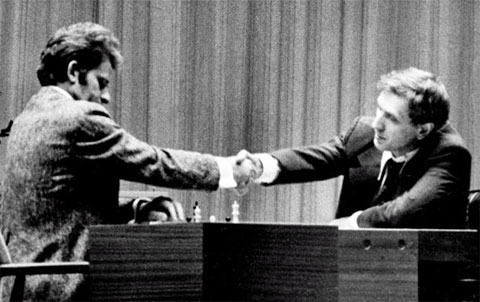As film protagonists go, Robert James “Bobby” Fischer, the subject of Edward Zwick’s latest film Pawn Sacrifice, is pretty compelling albeit a bit narrowly focussed.
If you’ve never heard of him, Fischer was one of the greatest chess players of all time who not only won the World Chess Championship in 1972, but actually managed to make chess one of the most popular sports in the world. This was due in no small part to the fact that he defeated the Russian then-champion Boris Spassky in a televised game that greatly benefited Washington’s propaganda machine deep into The Cold War.
Between the international tensions of the time, the political intrigue surrounding the USA’s use of Fischer to stir up jingoistic sentiment and Fischer’s own reputation as an egomaniacal misogynist and anti-semite, Pawn Sacrifice has the makings of a layered and highly watchable drama. So it’s a crying shame that the end result is devoid of any thrills or tension.
The first issue is the casting of Toby Maguire as Fischer; if the interviews available to watch on Youtube are anything to go by, Fischer wasn’t exactly a laugh-a-minute, but he had a certain spiky charm – none of which is evident in Maguire’s portrayal of him. Furthermore, since Fischer wasn’t exactly a flower-child (known for hate speech and general insanity), Maguire battles – and ultimately fails – to play a character that you’ll never once root for.
Maguire’s attempts at a Brooklyn accent are all over the place – in some scenes, it’s simply forgotten and in other supposed dramatic sequences – which essentially involve a lot of shouting – it’s laughable. The swagger and bravado of a national sports hero are so badly illustrated that Maguire comes across like a mouthy pre-pubescent trying to convince the adults that they should pay more attention to him.
Thankfully the rest of the cast is better. As Boris Spassky, Liev Schrieber is the closest thing to an antagonist the film has. Delivering lines that are mostly in Russian, and accompanied by an ever-present shadowy entourage, Spassky does seem like the type of opponent Fischer (and America) would be scared of.
The last two important characters are Maguire’s backing team. Michael Stuhlbarg is a lawyer and patriot interested in beating the Russians, so he helps set up the Fischer’s games against Russian players. It’s not a particularly memorable performance but it serves the narrative well.
Peter Sarsgaard, playing the holy man Father Bill Lombardy is arguably the best character in the flick. Sarsgaard plays Lombardy – who was also a chess player and Fischer’s coach – as a mentor. He runs through plays with Fischer and providing some necessary grounding amidst his friend’s spiralling madness and “Team America” of Stuhlbarg. Watching this Catholic priest spout an expletive while watching a great move on the board was one of the few delights here. It really says something about Pawn Sacrifice when the most grounded, believable character is a cussing, hard-drinking chess player in a clerical collar.

Our knowledge of Fischer’s life isn’t such that we can confidently tell you how close (or how far away from) historical events Pawn Sacrifice is, but we can tell you that its execution of plot points wobbles a lot. The film desperately tries to create some tension from the fact that Fischer repeatedly misses games, and continually pulls the “will he, won’t he” card. In fact, it plays this card so many times that it destroys any tension it once contained, leaving the audience frustrated. Honestly, we just wanted to see the damn chess game play out.
And here’s perhaps Pawn Sacrifice’s weakest aspect – the actual chess games feel like an afterthought. Admittedly chess doesn’t lend itself naturally to exciting cinema (see: Knight Moves). However, we didn’t learn anything about the intricacies of the game or the beauty of its depth at all. Various players occasionally speak about certain tactics (of which, the “pawn sacrifice” is one) and the rules of a tournament are explained, but it’s just set dressing.
The sets of the movie are a combination of 70’s aesthetic and music mixed in with black and white film. This was another miss for the movie: the setting never feels like a portal to that time – although the inclusion of both actual film and scenes recreated from historical footage were a nice touches.

Fischer’s paranoia and declining mental state is given some time and attention, but not nearly enough. The sound and visuals used to represent some of his psychosis – such as a character lightly knocking on a door becoming a booming thud – were done especially well, though. Fischer’s small and internalised mental ‘world’ makes for a highly watchable counterbalance to the world fame he gains through being a chess genius
Pawn Sacrifice review: Conclusion
Pawn Sacrifice is a let down. The source material had so much to offer but was butchered by inconsistent dialogue and a miscast lead. While there are good aspects to it, the end result is something of a misfire. If you want to experience drama with chess we suggest chess boxing – you may get a concussion but you won’t have to sit through this movie.
Verdict Prodigious potential squandered 40%

